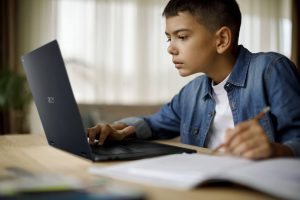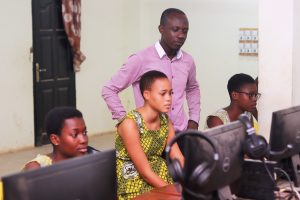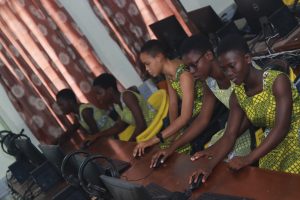E-LEARNING
The world is going through a very difficult moment with the outbreak of the novel Coronavirus pandemic. It has shaken the world to its core and has changed our way of life in ways we could never imagine. Many companies, schools and other institutions are closed down to slow down or curb the infection rate, thereby forcing workers to work from home.

Students at all levels are one of the hardest-hit group in this crisis. All classroom teaching and learning in Ghana has been suspended, all examination either rescheduled or cancelled, and any form of school activity is completely brought to a standstill. For example, the West Africa Examination Council which supervises final examination for senior High Schools in most West Africa countries have cancelled their examination which was scheduled to start in March. This is indeed unprecedented and the situation has a dire consequence on the progression of students from one stage to another in their educational journey. The President of Ghana in his ninth (9th) address to the nation on Sunday 10th May 2020, stated emphatically that schools at all levels in Ghana will remain closed indefinitely. It is projected that physical classroom setting in Ghana might not be in existence in the next few weeks ahead ie at least till the end of May 2020. This situation must be mitigated and solutions put in place to bridge the gap between students and their teachers.
The obvious solution now is Digitized Education otherwise known as E-LEARNING. By definition, E-learning is the method of teaching and learning in which the students and the teacher/instructor are separated by space and time whereby space is bridged by Information and Communication Technology (ICT) tools like computers, internet etc. This technology is apt to solve the predicament the world finds itself today.

This resonates perfectly with the project I am currently developing in collaboration with the International Sustainability Academy (ISA) in Hamburg, Germany. ISA gave me the opportunity to come to Germany for with a 9 months scholarship to develop a project on Digitalizing Education. Simply described my ISA project is to incorporate computers and other ICT tools into teaching and learning to make it more efficient and effective for students at the Ghana senior high school level. The objective of the project is to develop an E-learning platform that will contain well-developed content based on the syllabus of Ghana Education service. For pilot purposes, the focus is on ICT as a subject at the senior high schools in Ghana. My future ambition is to develop and upload contents for all subjects from Basic one(1) to the final year of the senior high school in Ghana and other parts of Africa. The current educational challenge posed by the outbreak of the COVID-19 has further reinforced and confirm my vision of promoting digitalized education across Ghana and Africa as a whole. E-learning must be seen as necessary to supplement the usual physical classroom education.

Schools, institutions and to a larger extent, the government must pay serious attention to e-Learning tools available or new ones yet to be developed to make teaching and learning possible. UNESCO has urged member countries to find innovative ways to make up for the contact hours students will loose as a result of the pandemic. They have encouraged countries to adopt one or more online learning tools to ensure teaching and learning is effective. In Ghana, all the major universities are setting up courses on their respective platforms to commence academic work in a few weeks to come. The University of Ghana, for example, had signed up to the SAKAI platform years ago but previously failed to make good use of it until now. Currently, it had ordered all its lecturers to sign in and start uploading contents in by the first week of April for academic work to start. The government of Ghana has introduced an online platform called iCAMPUS (https://icampusgh.com) for all Senior and Junior High school students to have access to all their contents for studies. It is also bringing back a policy dubbed “Presidential special initiative in Education” which will telecast prepared lessons based on the curriculum on national television for all students up to the senior school level.
Germany and other European countries that are badly hit by this pandemic are also making good use of E-learning technologies to keep students learning whilst they stay at home. According to Reuters, Britain’s Pearson (a leading global education company) has seen an “explosion” in demand for online learning, with traffic across its platforms quadrupling as millions of children start to adapt to homeschooling. John Fallon, the chief executive said, “We’ve seen a huge increase in the appetite for digital resources, across all our platforms globally we are seeing about a 400% increase in activity and that demand is growing day-by-day.” Pearson, according to the report has provided textbooks, assessments and digital services in 70 countries, trained an additional 24,000 teachers in online learning and gained 500,000 new learners in Italy. China launched a massive national online learning platform for the country’s secondary school students. It already has 169 lessons covering 12 subjects. To deliver the platform so quickly, the government contracted tech companies like Baidu, Huawei, and Alibaba, along with Telecom providers including China Telecom, China Unicom, and China Mobile, to work together to provide the cloud capacity and bandwidth. The platform is now operating with 90 terabytes of bandwidth and uses over 7,000 servers. It has been built for simultaneous use by 50 million students.

E-learning is an essential supplementary learning strategy in this era and all stakeholders must play their role to make its implementation a great success. The new paradigm shift in education across the world will provide enormous contents and learning advantages to students and teachers. There are some challenges associated with this new mode of teaching and learning; poor internet connectivity, lack of supervision, to name but these. With the changes I read on the media and reports I get from Ghana, it seems to me that e-learning has come to stay as a result, governments have to seriously consider supporting e-learning initiatives.



